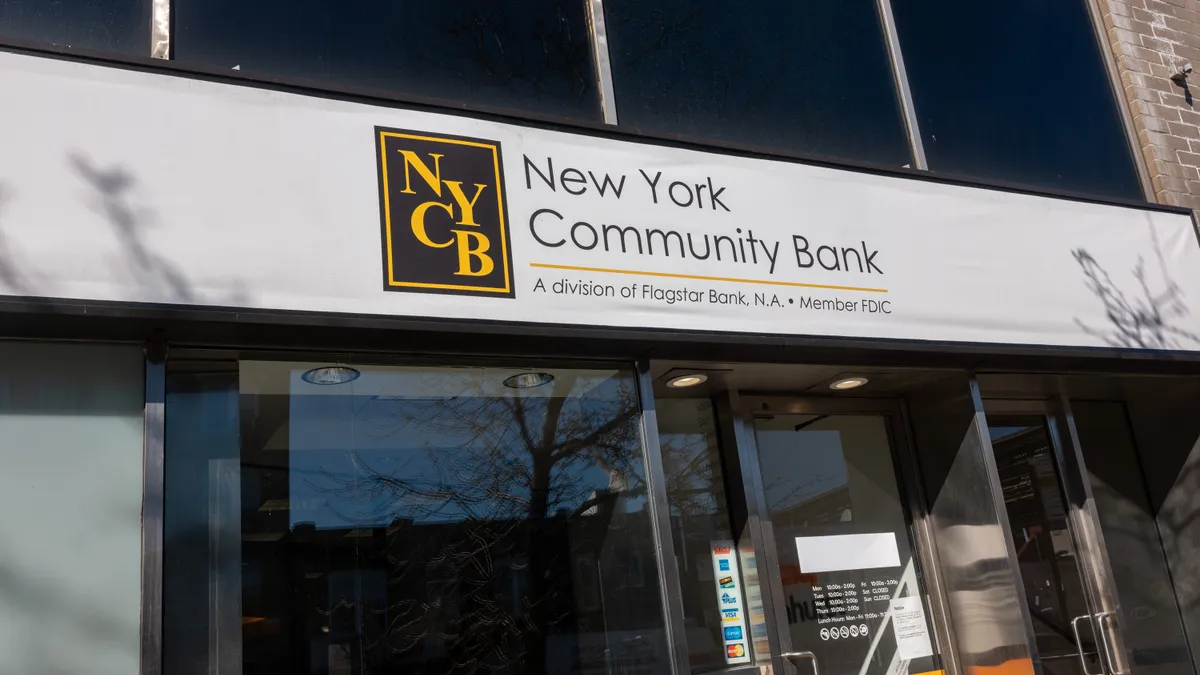Dive Brief:
- New York Community Bank has delayed its annual shareholder meeting by two weeks, to June 5.
- The struggling lender announced the change Friday. Previously, NYCB had identified May 17 as the date for its shareholder meeting. An NYCB spokesperson didn’t immediately respond to a request for comment on the change.
- The bank, at the time of the delay, had yet to say when it would report first-quarter results. Those are coming Wednesday.
Dive Insight:
The annual meeting isn’t the first deadline NYCB has pushed this year. The bank disclosed in February that it would not meet a deadline to timely file its annual report with the Securities and Exchange Commission. Around the same time, the bank also disclosed it would take a $2.4 billion goodwill impairment charge and apply it to the fourth quarter of 2023 — essentially increasing by tenfold the losses it reported for the three-month span.
NYCB disclosed a $252 million loss during its Jan. 31 earnings report — a surprise the bank likely doesn’t want to replicate when it reports first-quarter earnings.
The loss sent the bank’s share price into a tailspin that continued as it changed CEOs twice, revamped its board, and hired a new CFO, general counsel, chief risk officer and top audit executive.
Amid all of this, NYCB received a $1.05 billion capital infusion from ex-Treasury Secretary Steven Mnuchin’s Liberty Strategic Capital and other investors.
NYCB’s exposure to commercial real estate is largely seen as the driving force behind the bank’s losses. Loans tied to multifamily properties made up 44% of the lender’s $84.6 billion portfolio as of Dec. 31, Reuters has reported. About 8.3% of those loans were “criticized,” or at higher risk of default, the bank said in January.
When former Comptroller of the Currency Joseph Otting took the reins of NYCB in early March, he said he and his team intended to identify, over the next two months, loan portfolios the bank could put up for sale.
Those two months are nearly up.
“The nice thing about having a new management team is you can distance yourself from the old management team,” Keefe, Bruyette & Woods analyst Christopher McGratty told Bloomberg. “You can say, ‘We inherited this, and this is our plan.’”
Another factor in NYCB’s woes is its rapid growth. It acquired Flagstar Bank in 2022, purchased a large portion of failed Signature Bank roughly six months later, propelling it past a $100 billion-asset threshold that begets tougher regulator surveillance.
Analysts expect NYCB to set aside roughly $250 million in first-quarter loan-loss reserves, according to Bloomberg.
“They have to build the reserve aggressively, which will weigh on their profitability, and make it justifiable — but also don’t scare people,” McGratty told the wire service. “Messaging is really important.”
NYCB’s management might also face questions about talent poaching, after teams of private and commercial bankers fled to other New York-area lenders such as Peapack-Gladstone and Dime Community Bank.














